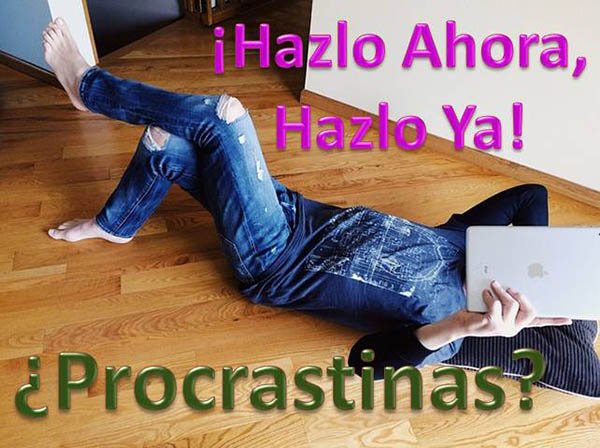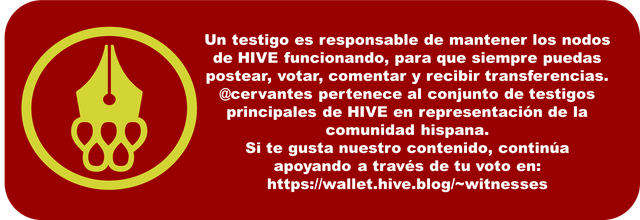
Hay frases que llegan a uno y te apropias de ellas porque como dicen, resuenan contigo, encuentras en ella algo significativo que te mueve, cuando la llevas a la práctica te hace sentir bien, y que has ganado algo. Eso me pasó con la frase que titula este escrito ¡Hazlo ahora, Hazlo ya!
La frase nos las regaló una profesora con la que hice un diplomado en Programación Neurolingüística, ese día trabajábamos el mal hábito del “para después” conocido con el rimbombante nombre de procrastinar
Procrastinar es un vocablo que viene del latín procrastinare donde pro significa adelante y crastinare: mañana que en el sentido que se le ha dado significa posponer para mañana. En palabras claras y sencillas es no hacer lo que tienes que hacer y decirte a ti mismo: — lo hago después—
Dejar las cosas para después, en sí mismo, no es que sea “malo”, no todo tiene que ser para ya, de forma inmediata. Si estamos cansados es necesario parar, descansar y terminar después, de igual manera hay situaciones, metas, proyectos que requieren tiempo para su realización, en estos casos la pausa no significa posponer sino llevar las cosas a tu ritmo sabiendo para dónde vas, definitivamente, esto no entra en la procrastinación.br>
¿Qué si es procrastinar?
Cuando por flojera, desidia, inercia dejas de hacer lo que sabes que “tienes que hacer” y, de paso, lo dejas de hacer con frecuencia, en diversas situaciones, convirtiendo este modo de actuar en un hábito, en un mal habito. Podemos procrastinar en acciones tan sencillas y cotidianas como recoger la casa antes de acostarnos o en proyectos que nos hemos planteado y que son importante culminar, como por ejemplo hacer una tesis para obtener un título, pero la vamos posponiendo tanto en el tiempo que finalmente no la hacemos.
Sea en un ámbito o en otro el dejar las cosas para después va creando un malestar interior que nos aleja notablemente del bienestar. Veamos algunas consecuencias del procrastinar.
Lo que nos deja el procrastinar

1.- El primero y yo diría que el más cruel es que nuestro pensamiento no nos deja tranquilos y esta a cada rato recordándonos lo que no hemos realizado, se convierte en un ruido mental que nos acompaña durante el día y capaz que hasta nos quita el sueño. Nos movemos en un constante: tengo que hacer, no lo he hecho, mañana si lo hago y aquello se va volviendo como un peso que llevamos sobre los hombros, que no sin razón, cada día nos sentimos más cansados, tanto mental como físicamente.
2.- La motivación se escapa, cuando posponemos, el mensaje que nos estamos enviando a nosotros mismos es: —Yo no puedo— y mientras más alargamos el asunto más afianzamos nuestra supuesta incapacidad. Procrastinar puede convertirse en un “matador de sueños”, nos induce a dejar de intentar por temor a no cumplir con nosotros mismos.
3.- Deterioramos nuestras relaciones interpersonales. Si hay algo molesto es que una persona se comprometa a algo y no cumpla, por supuesto que puede haber eventos, por lo que en un momento determinado no se pueda hacer algo y bueno contamos con la tolerancia y empatía del otro, pero cuando el asunto se vuelve una contante de incumplimiento nuestra credibilidad como persona responsable y comprometida se deteriora afectando diversas áreas de nuestra vida: la familia, los amigos o el campo laboral.
Un panorama triste ¿verdad? Porque la procrastinación no solo nos afecta a nosotros sino que también afecta a las personas que están a nuestro alrededor y que, de alguna manera, cuentan con nosotros. La buena noticia es que podemos hacer mucho para cambiar este mal hábito y en consecuencia llevar nuestra vida de una manera más relajada y en bienestar. Te comento alguna de estas acciones.
Algunos acciones para superar la procrastinación
1.- Organízate

A.- Haz una lista con todos esos pendientes que tienes.
B.- ordénalas con algún criterio, puede ser por: importancia, facilidad para realizarla, tiempo de dedicación, otro.
C.- Colócale fecha de realización: ¿hoy, mañana, dentro de una semana…?
D. Cada día haz tu lista de los “tengo que hacer hoy” y transfórmalos en un “quiero hacer hoy” si necesitas justificar ese quiero, qué mejor manera que decirte: porque me voy a sentir liberado, aliviado, porque me va a dar la satisfacción del “deber cumplido”, porque me va a quedar tiempo para hacer otras cosas más gratificantes.
2.- Comienza actuar
A.- Aprópiate e internaliza la frase: ¡Hazlo ahora, hazlo ya! , cada vez que te llegue el pensamiento: tengo que hacer o no he hecho, repítete ¡Hazlo ahora, hazlo ya! Si te es posible, deja de hacer lo que estás haciendo y ve a realizar el pendiente que tienes. Recuerda mientras más pronto lo hagas menos acciones se van acumulando y más liberado te sentirás. br>
B.- Cada vez que termines de realizar un pendiente ¡Táchalo de la lista! Y reafirma el —Si puedo hacerlo—
3.- Reconoce y disfruta

A.- Cada tachadura de esa lista es un logro, reconócelo y haz de ello un motivador que te impulse a seguir realizando esas actividades que, de pronto no son las más agradables, sin embargo, son importantes realizarlas.
B.- Disfruta el alivio que produce “quitarte esos pesos” que se van acumulando cuando no hacemos lo que “hay que hacer”. Siente y valora esa agradable sensación que da la satisfacción de haber cumplido con un compromiso adquirido, bien sea, con nosotros mismos o con los demás.
Dejar de procrastinar es proporcionarte consciente y deliberadamente bienestar, un bienestar que produce paz mental, dormir mejor, minimizar generadores de ansiedad y frustración y algo muy valioso, como es, el estar bien con uno mismo.

In English

There are phrases that come to you and you appropriate them because as they say, they resonate with you, you find in it something meaningful that moves you, when you put it into practice it makes you feel good, and that you have gained something. That happened to me with the phrase that titles this writing Do it now, Do it now!
The phrase was given to us by a teacher with whom I did a diploma in Neurolinguistic Programming, that day we were working on the bad habit of "for later" known by the bombastic name of procrastinating.
Procrastinate is a word that comes from the Latin procrastinare where pro means forward and crastinare: tomorrow, which in the sense that it has been given means to postpone for tomorrow. In clear and simple words it means not doing what you have to do and telling yourself: -I'll do it later-.
Leaving things for later, in itself, is not that it is "bad", not everything has to be for now, immediately. If we are tired it is necessary to stop, rest and finish later, in the same way there are situations, goals, projects that require time for their realization, in these cases the pause does not mean to postpone but to take things to your rhythm knowing where you are going, definitely, this does not enter in the procrastination.
What is procrastination?
When out of laziness, idleness, inertia you stop doing what you know you "have to do" and, by the way, you stop doing it frequently, in different situations, turning this way of acting into a habit, a bad habit. We can procrastinate in actions as simple and everyday as picking up the house before going to bed or in projects that we have planned and that are important to finish, such as doing a thesis to obtain a degree, but we postpone it so much in time that finally we do not do it.
Whether in one area or another, leaving things for later creates an inner discomfort that moves us away from well-being. Let's look at some of the consequences of procrastination.
What procrastination leaves us with

1.- The first and I would say the cruelest is that our thoughts do not leave us alone and are constantly reminding us of what we have not done, it becomes a mental noise that accompanies us during the day and may even take away our sleep. We move in a constant: I have to do, I have not done, tomorrow if I do and that is becoming like a weight that we carry on our shoulders, that not without reason, every day we feel more tired, both mentally and physically.
2.- Motivation escapes, when we postpone, the message we are sending to ourselves is: "I can't": -I can't- and the longer we procrastinate the more we reinforce our supposed inability. Procrastinating can become a "dream killer", it induces us to stop trying for fear of not fulfilling ourselves.
3.- We deteriorate our interpersonal relationships. If there is something annoying is that a person commits to something and does not comply, of course there may be events, so that at a certain time something can not be done and well we have the tolerance and empathy of the other, but when the matter becomes a constant of non-compliance our credibility as a responsible and committed person deteriorates affecting various areas of our life: family, friends or the workplace.
A sad scenario, isn't it? Because procrastination not only affects us but also affects the people around us who, in some way, count on us. The good news is that we can do a lot to change this bad habit and consequently lead our life in a more relaxed way and in well-being. Here are some of these actions.
Some actions to overcome procrastination
1.- Get organized:

A.- Make a list with all those pending things you have.
B.- Order them with some criteria, it can be by: importance, ease of completion, time of dedication, other.
C.- Set a date for completion: today, tomorrow, a week from today...?
D. Every day make your list of "I have to do today" and transform them into a "I want to do today" if you need to justify that I want, what better way than telling yourself: because I will feel liberated, relieved, because it will give me the satisfaction of "duty fulfilled", because I will have time to do other more rewarding things.
2.- Start acting
A.- Adopt and internalize the phrase: Do it now, do it now! Every time you have the thought: I have to do it or I have not done it, repeat to yourself: Do it now, do it now! If possible, stop doing what you are doing and go do the pending thing you have to do. Remember, the sooner you do it, the less actions accumulate and the more liberated you will feel.
B.- Every time you finish a pending task, cross it off the list! And reaffirm the -I can do it-.
3.- Acknowledge and enjoy

A.- Each crossing out of that list is an achievement, recognize it and make it a motivator that drives you to continue doing those activities that, maybe they are not the most pleasant, however, they are important to do them.
B.- Enjoy the relief that comes from "taking off those weights" that accumulate when we do not do what "has to be done". Feel and value that pleasant sensation that gives the satisfaction of having fulfilled a commitment, either with ourselves or with others.
To stop procrastinating is to consciously and deliberately provide you with well-being, a well-being that produces peace of mind, better sleep, minimizing anxiety and frustration generators and something very valuable,as it is, to be well with oneself.
Translated with www.DeepL.com/Translator (free version)
Fuente de las imágenes: Portada - 2 - 3 - 4




MIS REDES SOCIALES










The rewards earned on this comment will go directly to the person sharing the post on Twitter as long as they are registered with @poshtoken. Sign up at https://hiveposh.com.
Procrastinación: es un monstro que se fortalece a medida que vamos dejando para después cuanto objetivo, metas y planes nos proponemos, ese condenado bicho es feliz en la medida que dejamos la flojera nos dominé o le damos prioridad a otras labores, rutina, etc.
¿Qué debemos hacer para eliminarlo?🤓
Decir:
¡Yo si puedo! ¡Lo haré! ¡tengo toda la disposición y lo voy a lograr! ¡Este es el momento indicado!💪
Por cierto, ya vengo... voy a terminar un dibujo postergado desde hace un mes🙃😏
Jajaja, así es @yenmendt, el mañana lo hago, es un bicho que va creciendo, abarcando los espacios cuando acuerdas estas como Gulliver, amarrado por todos lados e inmovilizado más mental que físicamente. Saluditos, gracias por pasar y comentar😊
Hola @damarysvibra me encanta como planteas las consecuencias de dejar todo para despúes, yo soy de las personas que trato de establecerme una planificación diaria con metas y cosas que puedo cumplir, siempre le digo a las personas que cuando entramos en el circulo vicioso de estar dejando todo para luego es justamente porque nos falta una buena y sincera planificación del día a día. Ya sabes paso a paso.